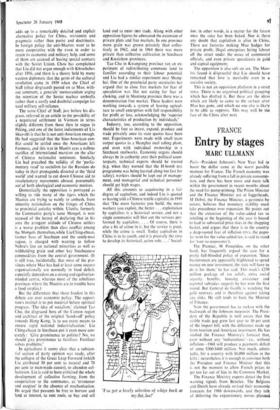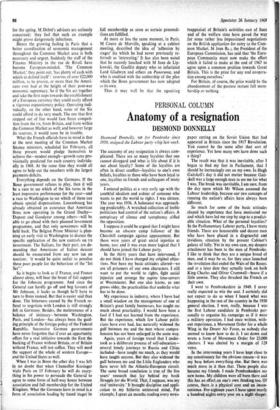Entry by stages
FRANCE MARC ULLMANN
Paris—President Johnson's New Year bid to boost the dollar came at the worst possible moment for France. The French economy was already suffering from a fall in private consump- tion, and there has been more and more talk within the government in recent months about the need for pump-priming. The Prime Minister and the Finance Minister are at loggerheads. M Debre, the Finance Minister, a pessimist by nature, believes that monetary stability must take precedence over expansion. He points out that the extension of the value-added tax to retailing at the beginning of the year is bound to lead to substantial price rises in the shopping basket, and argues that there is in the country a deep-rooted fear of inflation (rvs, the popu- lar term for the value-added tax, is said to stand for 'tour va augmenter).
The Premier, M Pompidou, on the other hand, has frequently argued the case for a pretty full-blooded policy of expansion. 'Since businessmen are apparently frightened to spend money on new investment, the state will have to do it for them,' he has said. This week's £250 million package of tax reliefs, extra social security benefits, housing assistance and regional subsidies suggests he has won the first round. But General de Gaulle is watching the gold reserves, and is therefore against taking any risks. He still tends to back the Minister of Finance.
Now the government has to reckon with the backwash of the Johnson measures. The Presi- dent of the Republic is well aware that the visible trade gap grew last year to 10 per cent of the import bill, with the difference made up from tourism and American investment. He has studied the Finance Ministry's forecast that, even without any 'indiscretions'—i.e., without inflation-1968 will produce a payments deficit of some $3004400 million. Not much, admit- tedly, for a country with $6,000 million in the kitty : nevertheless it is enough to convince both the President and Finance Minister that this is not the moment to allow French prices to get too far out of line in the Common Market.
The Finance Ministry experts detect the first warning signals from Benelux. The Belgians and Dutch have already revised their economic forecasts for 1968 downwards, and they talk of deferring the expansionary moves planned for the spring. M Debres advisers arc seriously concerned: they feel that such an example might prove dangerously infectious.
Hence the growing feeling in Paris that a better coordination of economic management throughout the Common Market area is both necessary and urgent. Suddenly the staff of the Finance Ministry in the rue de Rivoli have become European-minded. The Common Market,' they point out, 'has plenty of cash with which to defend itself': reserves of over $22,000 million, to be precise, or more than the Ameri- cans ever had at the height of their post-war economic supremacy. So if the Six act together and take the first steps towards the establishment of a European currency they could easily afford a vigorous expansionary policy. Operating indi- vidually, on the other hand, none of the Six could afford to do very much. The one that first stepped out of line would face fierce competi- tion from the us, from Britain, and from within the Common Market as well; and however large its reserves, it would soon be in trouble. '
What the French officials have in mind is that it the next meeting of the Common Market ' finance ministers; scheduled for 'February, all those present would pledge themselves to 'achieve the—modest enough—growth rates pro- visionally predicted for each country individu- ally in 1968. At the same time they would all agree to help out the members with the largest payments deficits.
Everything depends on the Germans. If the Bonn government refuses to play, then it will be a race to see which of the Six turns in the least impressive performance for the year—and a race to Washington to see which of them can obtain special dispensations. Luxembourg has :already obtained an assurance that American 'firms now operating in the Grand Duchy— 'Dupont and Goodyear among others—will be able to go ahead with their planned Investment 'programme, and that only newcomers will be held back. The Belgian Prime Minister is plan- ning an early visit to Washington to discuss the specific application of the new controls on us investment. The Italians, for their part, are de- manding that Americans of Italian descent should be exonerated from any new tax on tourism : 'it would be quite unfair to penalise these poor people forthe behaviour of the "Jet Set".'
So it begins to look as if France, and France almost alone, will bear the brunt of full support for the Johnson programme. And since the General can hardly go off and beg favours of Mr Johnson, it looks as though he'll have to turn to Bonn instead. But that is easier said than -done. The bitterness caused by the French re- fusal to negotiate with London is still strongly felt in Germany. Besides, the maintenance of a -balance of intimacy—between Washington, Paris, and London—has always been the guid- ing principle of the foreign policy of the Federal Republic. Successive German governments have never forgotten that if ever an opportunity • offers for a real initiative towards the East the backing of France without Britain, or of Britain without France, will not suffice. They will need the support of the whole of western Europe— and the United Slates as well.
When I was in Bonn the other day I was left in no doubt that when Chancellor Kiesinger Visits Paris on 15 February he will do eyery- thing in his power to persuade the General to agree to some form of half-way house between association and full membership for the United 'Kingdom. What the Germans have in mind is a form of association leading by limed -stages to fpll membership as soon as certain precondi- tions are fulfilled.
At more or less the same moment, in Paris, M Couve de Murville, speaking at a cabinet nieeting, described the idea of 'adhesion by stages' (to which he had never previously re- ferred) as 'interesting.' It has also been noted that he recently lunched with M Jean de Lip- kowski, the Gaullist deputy who so infuriated Lord Gladwyn and others on Panorama, and who is credited with the authorship of the plan which the Bonn government has now adopted as its own.
Thus it may well be that the agonising reappraisal of Britain's activities east of Suez and of the welfare state have paved_ the way for some rather less impassioned negotiations on the British application for entry to the Com- mon Market. M Jean Re!, the President of the European Commission, has said that 'the Euro- pean Community must now make the effort which it failed to make at the end of 1967 to • agree upon a common position towards Great Britain. This is the price for any real coopera- tion among ourselves.' .
For Britain, of course, the price would be the • abandonment of the posture instant full mem- bership or nothing.



































 Previous page
Previous page